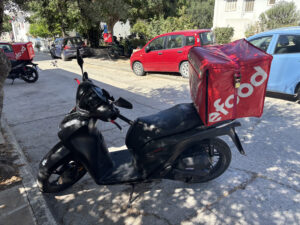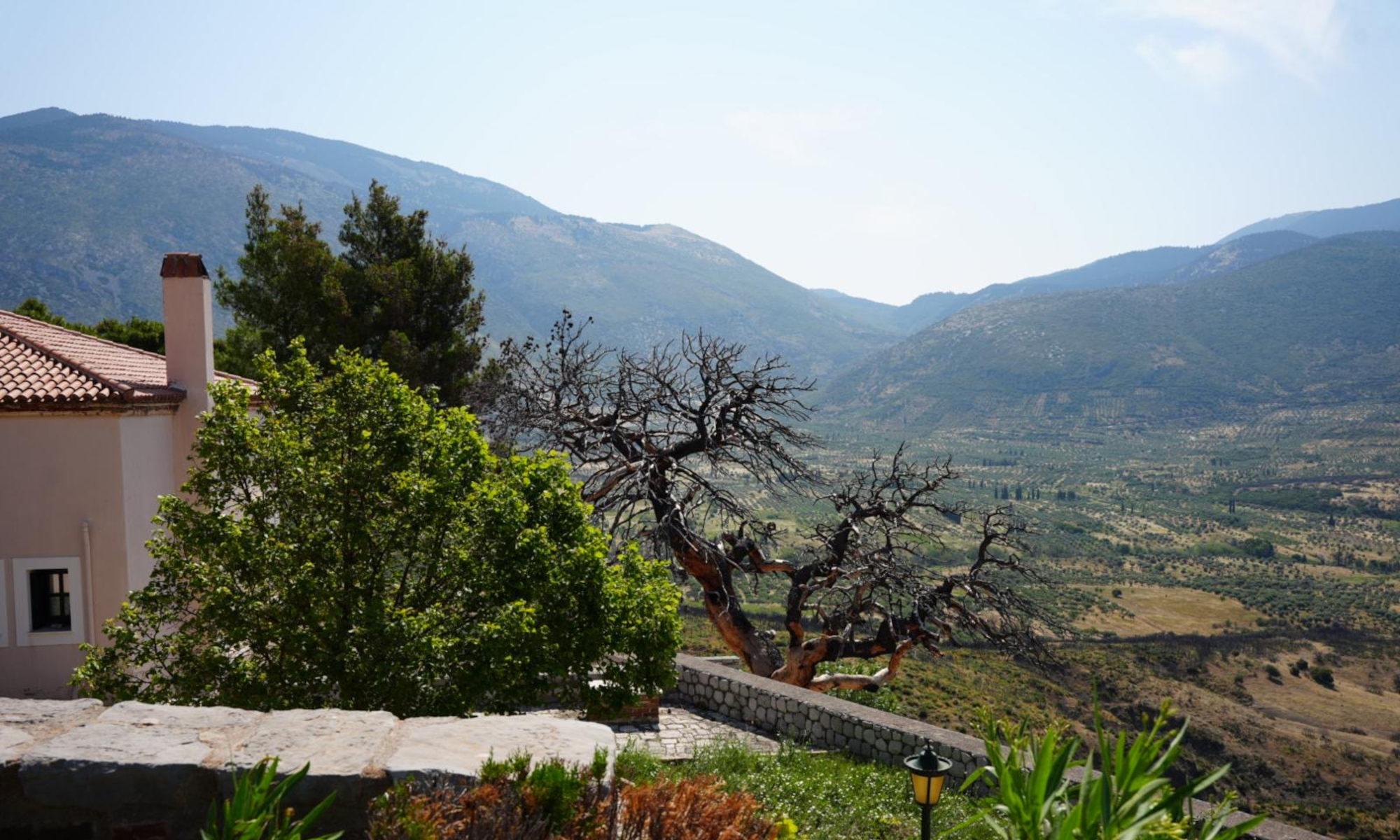efood has landed on Paros. Its couriers have traversed far more than restaurant doors and seaside roads.
By Noah LaBelle

Zahid Mehmood couldn’t remember the last time he’d done anything but walk and sleep. Nineteen days earlier, he’d set out from Karachi, Pakistan, on foot, before crossing into Turkey. It was December 2015, just before European borders began to tighten. Soon, his feet could take him no further. On the Greek island of Kos—just 4 kilometers off the Turkish coast—he boarded a three-meter boat, crammed with thirteen others, bound for the port of Piraeus.
Once Mehmood made it safely to Athens, he heard that another nineteen people had died attempting the same passage after him. He could only thank God—and the UN, which clothed, fed, and put him up in a hotel for a week. It took him another two months to land a construction gig, the same work he’d done since age fifteen in Islamabad, Pakistan’s capital.
This May, Mehmood’s boat ride was much less treacherous: a high-speed ferry to Paros, where he now delivers takeout by motorcycle.
“Athens has too much heat,” he told me on a recent Thursday afternoon. “Here, I have the sea. There’s not too much traffic, not too much pollution. It’s a very peaceful place.” He was lounging on a semi-circular stone bench outside the Paros Byzantine Museum with three other couriers in red efood vests, refreshing their food delivery apps. “It’s like a shared office!” Mehmood, thirty, said, a fanny pack slung over his shoulder. They’d clocked in at noon and would stay until ten. In the distance, another ferry pulled in, spilling visitors and their suitcases.
efood launched on Paros this summer. Mehmood stepped away from the scaffolding in 2020, when pandemic lockdowns impelled a food delivery boom. Now, he and eleven other Pakistanis working for efood in Athens have relocated to the island, where they share two villas. They’ve arrived just in time for high season—July through August—when Paros overflows with Greeks and foreigners alike. By September, they’ll return to the mainland.
Tourists come with their culinary tastes, and leave Paros with less of its own. “There are not that many tavernas—it’s my main problem, seriously,” Sophia Katsipi, the president of the Realtors Association of Paros and Antiparos, said. “To go to these little tavernas with the beautiful, local produce…I don’t want to see another sushi place. I’ve had enough.”
While locals may think the island is oversaturated, investors often argue new restaurants or hotels will create jobs for Parians. “But this island doesn’t suffer from unemployment,” Costas Bizas, the mayor of Paros, told me. “So who will you create new jobs for, and how are you going to find those people to work for you?”
The answer, often, is men like Mehmood. (There are enough Pakistanis, Afghans, and Bengalis on the island to field a cricket match on Sundays from six to eight or nine, depending on the number of overs.) What sold Mehmood on moving to Paros was what drew him to efood in Athens, and what pushed him to leave Pakistan: the pay. “After one day of work, it’s finished if you have two people [to provide for],” he said of his hometown.
That didn’t include the heat. In Islamabad, he worked outside, always, on two-story shells that trapped the humidity. In Athens’ high-rises, less sweltering but sweltering still, he sometimes worked indoors. The salary was fixed at seventy euros for eight hours. efood paid a tad better, with looser hours, and no dust. On Paros, his pay doubled to meet the island’s costs. “Now I care for all of my family,” he said: seven siblings, and his parents, his father retired from electrical work.
“If I have papers, I’ll go back and get married,” Mehmood said. That’s proven challenging. He’s been waiting since April 2024 for his third country national application to be approved by the Greek government. “I have nine years of proof, tax proof, doctors notes,” he said. “Maybe it will happen. I don’t know. God only knows.”
The next day, I returned to the pine-shaded area where Mehmood and his crew spend the majority of their waking hours, but he was nowhere to be found. A smattering of cigarette butts lay inside the stone semicircle. Some of his colleagues had draped cardboard sheets over it, more comfortable for long stints.
Soon, Mehmood returned, fresh off a delivery. “It’s a tourist speaking English,” he told me. “His order is eleven euro, but in his mind, it’s ten euro fifty.” Mehmood informed him, and got an apology with the missing coins. As he showed me the receipt on his iPhone, a ping sounded, twice, arpeggiated.
“Oh my God,” he exhaled. He’d been seated for ninety seconds, tops. (The day prior, I hadn’t seen him get a single order during a multi-hour conversation.) Now, onto Orange Cafe, for two coffees and a sandwich. Seventeen euros. He’d earn two forty-seven.
He crossed the street, quick but unhurried. On a side road, motorcycles clustered among parked cars, their red efood boxes ratcheted on tight. One was his, bought last year for €4,200, with an Apple sticker on the front fender.
“I must be careful,” he said, unzipping the box to reveal his helmet. “In Athens, I left helmets on my bike, twice, then I came back: no helmet.”
“I’ll come back, I’ll come back,” he reassured me. “Only just four, five minutes.” The engine revved. He didn’t flip down his visor. Then he was gone—a right at the roundabout, before the coffee could cool. ♦
